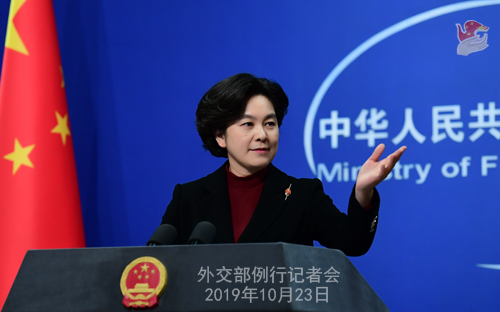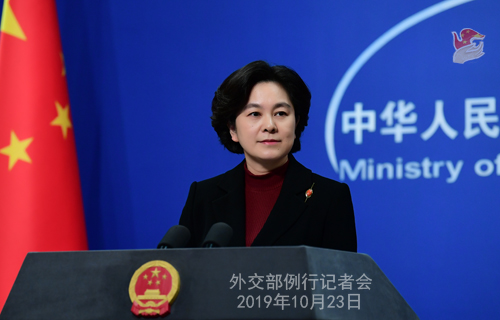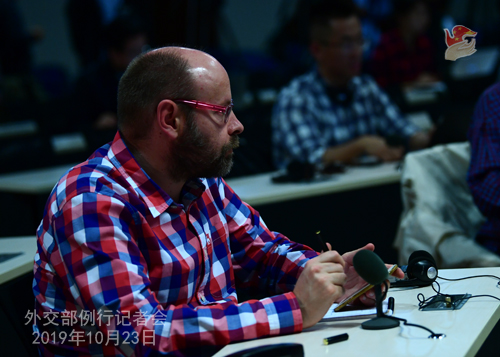| Foreign Ministry Spokesperson Hua Chunying's Regular Press Conference on October 23, 2019 |
| 2019-10-23 20:37 |
|
Q: According to media reports, at a plenary after the opening ceremony of the 70th International Astronautical Congress (IAC) held in Washington on October 21, more than 1,000 attendees brought the following question atop the panel voting system: "I miss an important space agency in this panel. Where is China?" It is said that the Chinese delegation's absence is due to obstruction in obtaining US visas. Could you confirm and provide more information? A: I saw the news in media reports. After timely checking with the China National Space Administration (CNSA), we have confirmed that the reason for the Chinese delegation's absence from the IAC is that the US side did not issue them visas in time. As is well known, the IAC is a major event in the space sector held by the International Astronautical Federation (IAF), the International Academy of Astronautics and the International Institute of Space Law. Known as the Olympics in the space sector, the IAC is attended annually by thousands of government officials, entrepreneurs and scientists all over the world. As a supporter for multilateral space cooperation, China has been a major participant in the IAC that sends a delegation to the congress every year. China submitted a preliminary list of delegates attending the IAC to the US in July, three months ahead of the event. On October 12, the CNSA delegation went to the US embassy in China for visa interviews. However, the head of delegation was not issued a US visa when the IAC opened. That's why the Chinese delegation could not attend the opening ceremony, the heads of agency forum and other important events. That's the cause of the trending topic "IAC without China" that you mentioned. More than 1,000 attendees baffled by this brought the question "I miss an important space agency in this panel. Where is China?" atop the panel voting system via their smart-phones. The picture showing this question on a big screen at the IAC venue came out, drawing much attention in the international community. As I understand, among those who did not obtain US visas are the incumbent IAF Vice President, Vice President of the China Aerospace Science & Technology Corporation, IAF electoral committee member and Secretary-General of the Chinese Society of Astronautics. You may know that US Vice President Mike Pence delivered remarks at the opening ceremony. Interestingly, instead of announcing anything new in US space policy or international cooperation, he declared US-led international space cooperation with "like-minded, freedom-loving nations". His remarks with strong political implication found a repulsed audience who see this as something against the IAF purpose that calls for international cooperation. As a matter of fact, this case involving CNSA is only a tip of the iceberg. As we recently stated, the US has for some time been denying visas to, delaying processing visa applications of and revoking long-term visas for Chinese scholars, students, entrepreneurs and scientists as well as searching and harassing them. Such obstruction in normal people-to-people and cultural exchange between China and the US infringes upon Chinese personnel's security and lawful rights and interests. Besides, you may also noticed reports on the US denying visas to Russian and Iranian delegates to the 74th UNGA, which is a violation of the 1947 Agreement Between the United Nations and the United States Regarding the Headquarters of the United Nations. The US is weaponizing visa in defiance of its international responsibilities and obligations. Its obstruction of normal exchange and cooperation has harmed the legitimate and lawful rights and interests of relevant parties of the international community. We urge the US to do some earnest self-reflection and correction. Q: The Taliban spokesman said last night that China has invited a delegation to participate in the intra-Afghan dialogue. Can you give us some details about this invitation? A: China firmly supports the "Afghan-led, Afghan-owned", broad and inclusive process of peace and reconciliation. We support the intra-Afghan dialogue between the Afghan government, the Afghan Taliban and other parties. We are ready to offer convenience and assistance for Afghanistan's peace and reconciliation process based on our respect for the will of all relevant Afghan parties. The information you asked about, if we have it, will be released in due course. Q: One US leader said on October 21 in a cabinet meeting that China wants to make a trade deal, and that the Chinese economic growth rate, possibly below zero, is the lowest in 57 years, which is good for reaching a deal. I wonder if you have any comment on his remarks? A: China's National Development and Reform Commission recently held a press briefing on our country's macro-economic performance. This year our economy has enjoyed a sound momentum of stable growth. In the first three quarters, our GDP grew by 6.2 percent, ranking among top of world's major economies, which is indeed a hard-won result considering the growing difficulties, risks and challenges China faces, both internally and externally. The slight slowdown in China's economic growth matches its transformation from high-speed growth to high-quality growth. Certain person's doubt on our economic data is clearly unfounded. I'd like to stress that China remains a main driver of and a major contributor to world economic growth. According to IMF statistics, China contributed as much as 34 percent to global GDP growth from 2009 to 2018. In today's world of globalization, the Chinese economy and the world economy are highly integrated with a mutual stake. The world has already made an objective judgment on the Chinese economy and its contribution to the world economy, which will not be affected by some wanton words from a random person. In fact, tarnishing others will not help solve one's own problems at home or resolve differences through consultation. Faced with greater instability, uncertainties and downward pressure in world economy, countries should stick to mutually beneficial cooperation and make practical efforts for the strong, sustainable, balanced and inclusive growth of the world economy instead of doing the opposite.
Q: The DPRK's leader Kim Jong Un reportedly instructed the removal of ROK facilities in Mount Kumgang during his visit there. Some analysts say this will affect the inter-Korea relations. Do you have any comments on that? A: The DPRK and the ROK share the same ethnic origin. The inter-Korea relationship has an important influence on the situation of the Korean Peninsula as well as peace and stability in the region. As a close neighbor, China supports the two sides in improving their relations through dialogue and consultation and advancing reconciliation and cooperation, which will meet the common interests of people in the DPRK, the ROK and the region. Q: There are reports that US Secretary of State Pompeo said at the Heritage Foundation Annual President's Club Meeting on October 22 that "China is a strategic competitor at best that uses coercion and corruption as its tools of statecraft". Would you like to respond to that? A: In inter-person relations, habitual liars who badmouth others are often despised and shunned as unworthy companions. But in international relations, when facing malicious slandering, we must clarify facts and state our position. First, as a responsible major country, China stands upright with honor. We never strong-arm others, never seek supremacy, never withdraw from commitments, never bully others, and never complain. The word "coercion" has nothing to do with China. Rather, it is such a fitting description of the US that it needs no modesty on this point. Second, in recent years, the CPC has enacted strict party discipline and achieved positive results through deepened anti-corruption drive. It has not only been endorsed by the Chinese people, but also gained the respect and acclaim from the international community. In contrast, according to reports by European and US media such as NBC and the Guardian, the US public generally believes there is a great deal of "money for votes" in US elections. Congress seats fall prey to enterprises, rich people and special interest groups. The average cost for winning a Senate seat, based on the reports, stands at 19.4 million USD while that for a House seat is about 1.5 million USD. For us in China, that is utterly beyond imagination. A lie, even if repeated a thousand times, will not become the truth. The US should focus on self-improvement to address its domestic problems instead of shifting the blame onto others. Attempting to frame others with empty rhetoric will only undercut one's own credibility and end up being a laughing stock. Q: Russian President Putin signed an agreement with Turkish President Erdogan on October 22 regarding the situation in northern Syria. According to this agreement, the Russian military and Syrian border troops will help the Kurdish militia and equipment to withdraw from the border areas between Turkey and Syria in six days. After that, the Russian and Turkish forces will begin joint patrols to a depth of 10 kilometers from the Syria-Turkish border to the west and east of the Operation Peace Spring zone. I wonder if you have any comment? A: China hopes this agreement between Russia and Turkey will contribute to de-escalation in the region. We hope all relevant parties will work together, earnestly respect and safeguard Syria's sovereignty, independence and territorial integrity, create favorable conditions for more progress in the political settlement of the Syrian issue, and make concerted efforts in fighting terrorism.
Q: State Councilor Wang Yi just concluded his visit to Switzerland. Can you give us some details about his visit and your comments on it? A: Indeed, State Councilor Wang Yi just concluded his visit to Switzerland. During this visit, State Councilor Wang Yi met with President Ueli Maurer and co-chaired the second round of China-Switzerland Foreign Ministers' Strategic Dialogue with Swiss Federal Councilor and Foreign Minister Ignazio Cassis. Both sides had in-depth communication with the Swiss side. Both sides reached important consensus and decided to work for new progress in the China-Switzerland innovative strategic partnership. The Swiss side made positive comments on China-Switzerland relationship and its smooth development, and noted that it is a front-runner in China's bilateral relations with European countries. The Swiss side fully supports the Belt and Road Initiative (BRI) proposed by President Xi, and believes the BRI will serve as a bridge for China-Europe cooperation of higher quality, delivering major opportunities to both Switzerland and Europe. The Swiss side is ready to further consolidate mutual political trust with China and deepen cooperation in trade, investment, finance, environmental protection and innovation. It also welcomes Chinese companies in Switzerland for investment. Switzerland believes that China is an anchor and a positive energy for world peace and prosperity. The Swiss side will enhance communication with China in regional and international affairs and join hands in practicing multilateralism and free trade. Both sides also exchanged views on human rights and other issues. State Councilor Wang noted that a dialogue can be sound and sustainable only if both sides respect each other on an equal footing. When asked by the Swiss side about the situation in China's Hong Kong and Xinjiang, State Councilor Wang stressed that Hong Kong- and Xinjiang-related issues are China's internal affairs that allow no foreign interference. He talked about the facts and China's principled position on these issues. President Maurer and Foreign Minister Cassis expressed sincere admiration for China's great achievements in the past 70 years, and their readiness to carry out dialogue and cooperation in human rights and other areas based on equality and mutual respect. Q: Regarding the case of a murder suspect Chan Tong-kai, the Hong Kong SAR has asked Taiwan to take him to Taiwan for trial. However, Hong Kong has rejected Taiwan's offer to send a delegation to bring him back to Taiwan. Do you have any explanations to why Hong Kong would take that position? A: This is not a diplomatic matter. The Hong Kong SAR government will properly handle it. Q: You just announced the talks between the intra-Afghan groups, especially the Taliban and the Afghan government. Could you give us the time-line and tell us when these talks are planned to be held here? A: I talked earlier about China's principled position. We support the "Afghan-led, Afghan-owned", broad and inclusive process of peace and reconciliation, and we are ready to offer necessary convenience and assistance for the intra-Afghan dialogue and the peace and reconciliation process. I have nothing to update you at the moment. Once we have the information, we will release it in due course.
|
 |
|




